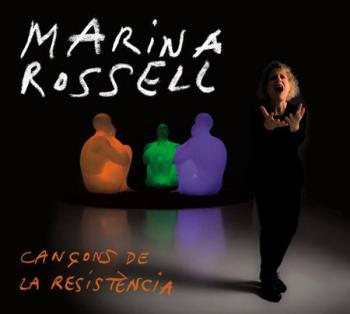Бьется в тесной печурке огонь,
На поленьях смола, как слеза.
И поет мне в землянке гармонь
Про улыбку твою и глаза.
Про тебя мне шептали кусты
В белоснежных полях под Москвой.
Я хочу, чтобы слышала ты,
Как тоскует мой голос живой.
Ты сейчас далеко, далеко,
Между нами снега и снега.
До тебя мне дойти нелегко,
А до смерти — четыре шага.
Пой, гармоника, вьюге назло,
Заплутавшее счастье зови.
Мне в холодной землянке тепло
От моей негасимой любви.
На поленьях смола, как слеза.
И поет мне в землянке гармонь
Про улыбку твою и глаза.
Про тебя мне шептали кусты
В белоснежных полях под Москвой.
Я хочу, чтобы слышала ты,
Как тоскует мой голос живой.
Ты сейчас далеко, далеко,
Между нами снега и снега.
До тебя мне дойти нелегко,
А до смерти — четыре шага.
Пой, гармоника, вьюге назло,
Заплутавшее счастье зови.
Мне в холодной землянке тепло
От моей негасимой любви.
Contributed by Bernart Bartleby - 2016/2/15 - 14:57
Language: English
La traduzione inglese come inclusa in “Stalingrad” (1999), romanzo storico di Antony Beevor, scrittore inglese e studioso di storia militare.
ZEMLYANKA
The fire is flickering in the narrow stove
Resin oozes from the log like a tear
And the concertina in the bunker
Sings to me of your smile and eyes.
The bushes whispered to me about you
In a snow-white field near Moscow
I want you above all to hear
How sad my living voice is.
You are now very far away
Expanses of snow lie between us
It is so hard for me to come to you
And here there are four steps to death.
Sing concertina, in defiance of the snowstorm.
Call out to that happiness which has lost its way.
I'm warm in the cold bunker,
Because of your inextinguishable love.
The fire is flickering in the narrow stove
Resin oozes from the log like a tear
And the concertina in the bunker
Sings to me of your smile and eyes.
The bushes whispered to me about you
In a snow-white field near Moscow
I want you above all to hear
How sad my living voice is.
You are now very far away
Expanses of snow lie between us
It is so hard for me to come to you
And here there are four steps to death.
Sing concertina, in defiance of the snowstorm.
Call out to that happiness which has lost its way.
I'm warm in the cold bunker,
Because of your inextinguishable love.
Contributed by Bernart Bartleby - 2016/2/15 - 14:58
E tipo una diciottina di ospedali bombardati in Siria da chi sa chi, eh... sarà propaganda americana, lo so
Che sfasamento
Che sfasamento
krzyś - 2016/2/15 - 21:58
Language: Catalan
Versione catalana (limitata alla terza strofa del brano originale) di Josep Tero, come interpretata da Marina Rossell in “Cançons de la resistència”, 2015
Testo trovato su Cancioneros.com

Perché limitare la versione a solo una delle sue quattro strofe originali? Perché non attribuire il brano ai suoi autori, ben noti, e definirla “Popular - Cançó russa de la guerra”? Boh…
Stesse riserve già espresse per la versione catalana de Die Moorsoldaten [Börgermoorlied; Das Moorlied]…
Testo trovato su Cancioneros.com

Perché limitare la versione a solo una delle sue quattro strofe originali? Perché non attribuire il brano ai suoi autori, ben noti, e definirla “Popular - Cançó russa de la guerra”? Boh…
Stesse riserve già espresse per la versione catalana de Die Moorsoldaten [Börgermoorlied; Das Moorlied]…
ZEMLIANKA
Ets tan lluny, i és tan gran la dissort,
que la neu ha colgat l’últim port.
Ja mai més no et veuré, país meu…
Sóc aquí ben a prop de la mort.
Ets tan lluny, i és tan gran la dissort,
que la neu ha colgat l’últim port.
Ja mai més no et veuré, país meu…
Sóc aquí ben a prop de la mort.
Contributed by Bernart Bartleby - 2016/2/16 - 11:32
Language: Spanish
Traduzione spagnola di Marina Rossell della versione catalana di Josep Tero da lei stessa interpretata
Testo trovato su Cancioneros.com
Testo trovato su Cancioneros.com
ZEMLIANKA
Estás tan lejos, y es tan grande el infortunio,
que la nieve ya ha cubierto el último puerto.
Ya jamás volveré a verte, país mío…
Aquí estoy, cerca, muy cerca, de la muerte.
Estás tan lejos, y es tan grande el infortunio,
que la nieve ya ha cubierto el último puerto.
Ya jamás volveré a verte, país mío…
Aquí estoy, cerca, muy cerca, de la muerte.
Contributed by Bernart Bartleby - 2016/2/16 - 11:33
×
![]()
Note for non-Italian users: Sorry, though the interface of this website is translated into English, most commentaries and biographies are in Italian and/or in other languages like French, German, Spanish, Russian etc.







[1941]
Versi di Aleksej Aleksandrovič Surkov (1899-1983), poeta e scrittore russo, uno molto in vista nei decenni staliniani
Musica di Konstantin Listov / Константин Яковлевич Листов (1900-1983), compositore sovietico, nato in Ucraina.
Testo in cirillico e traslitterazione latina (che però lascio a Riccardo, visti i miei precedenti strafalcioni in merito) trovati su Marxists.org
Durante l’offensiva nazista contro l’Unione Sovietica Alexey Surkov era corrispondente di guerra ed ebbe a trovarsi nel bel mezzo della battaglia di Mosca (2 ottobre 1941 – 7 gennaio 1942). E qui, sprofondato in una zemlianka, un rifugio sotterraneo tipico di alcuni paesi dell’Est Europa, usato sia in tempo di pace che in guerra, compose questa poesia di resistenza e d’amore.
In seguito Surkov divenne uno degli intellettuali della nomenklatura staliniana, ma questa è un’altra storia.
Messa in musica da Listov, dal 1942 le sue strofe furono assai amate e cantate dai soldati dell’Armata Rossa al fronte.
La battaglia di Mosca segnò la prima importante battuta d’arresto dell’invasione nazista. Hitler s’incazzò così tanto da decretare la rimozione del comandante in capo Heinrich Alfred Hermann Walther von Brauchitsch e di tutto il suo entourage, assumendo direttamente il comando delle operazioni. Fu un gravissimo errore: circondato da ufficiali compiacenti ed inesperti, fu il Führer stesso a porre i presupposti della futura sconfitta del Reich sul fronte orientale e, in definitiva, della sua fine.
Nella battaglia, che infuriò nel pieno dell’inverno con temperature che arrivarono a toccare i -45° (ecco perché una zemlianka poteva significare la salvezza), morirono o restarono feriti 175.000-400.000 tedeschi e 650.000-1.280.000 sovietici…